#Labor and Welfare
Text
Japanese Central Government Agency (1) Ministry of Health, Labor and Welfare
Unemployment benefits are calculated based on the average daily wages for the six months before the assessment, but the Ministry of Health, Labor and Welfare ignores the actual weekly holiday system and assumes that workers will work on Saturdays and Sundays.
Therefore, what is paid is (daily wage) × 5 ÷ 7,
Only 70% will be paid from the beginning.
It's a nice calculation.
Rei Morishita
日本の中央官庁(1)厚生労働省
失業給付は、査定の目前6か月の、平均日給をもとに算出するが、厚生労働省は、現実の週休日制を無視し、土曜日・日曜日も出勤するとみなす。
そこで、支給されるのは(日給)×5÷7で、
はじめから70%しか支給されないことになる。
立派な計算である。
#Japanese Central Government Agency#rei morishita#Ministry of Health#Labor and Welfare#Unemployment benefits#70%#nice calculation#assumes that workers will work on Saturdays and Sundays
2 notes
·
View notes
Text
Precaratize bosses
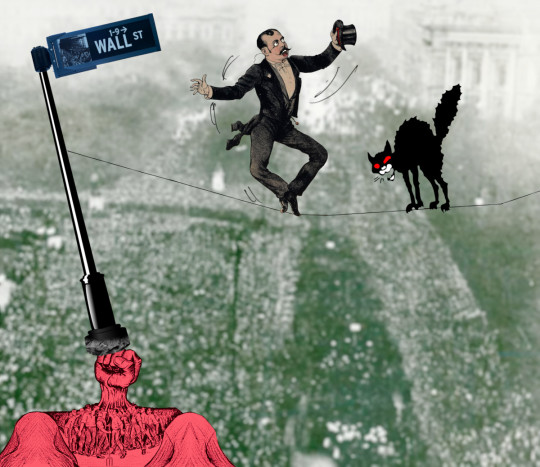
I'm touring my new, nationally bestselling novel The Bezzle! Catch me SUNDAY (Apr 21) in TORINO, then Marin County (Apr 27), Winnipeg (May 2), Calgary (May 3), Vancouver (May 4), and beyond!

Combine Angelou's "When someone shows you who they are, believe them" with the truism that in politics, "every accusation is a confession" and you get: "Every time someone accuses you of a vice, they're showing you who they are and you should believe them."
Let's talk about some of those accusations. Remember the moral panic over the CARES Act covid stimulus checks? Hyperventilating mouthpieces for the ruling class were on every cable network, complaining that "no one wants to work anymore." The barely-submerged subtext was their belief that the only reason people show up for work is that they're afraid of losing everything – their homes, their kids, the groceries in their fridge.
This isn't a new development. Back when Clinton destroyed welfare, his justification was that "handouts" make workers lazy. The way to goad workers off their sofas (and the welfare rolls) and into jobs was to instill fear in them:
https://www.theatlantic.com/business/archive/2018/03/welfare-childhood/555119/
This is also the firm belief of tech bosses: for them, mass tech layoffs are great news, because they terrorize the workers you don't fire, so that they'll be "extremely hardcore" and put in as many extra hours as the company demands, without even requiring any extra pay in return:
https://fortune.com/2022/10/06/elon-musk-jason-calacanis-return-to-office-gentlemens-layoffs-twitter/
Now, there's an obvious answer to the problem of no one taking a job at the wage being offered: just increase the offer. Capitalists claim to understand this. Uber will tell you that surge pricing "incentivizes drivers" to take to the streets by offering them more money to drive during busy times:
https://www.uber.com/blog/austin/providing-rides-when-they-are-most-needed/
(Note that while Uber once handed the lion's share of surge price premiums to drivers, these days, Uber just keeps the money, because they've entered the enshittification stage where drivers are so scared of being blacklisted that Uber can push them around instead of dangling carrots.)
(Also note that this logic completely fails when it comes to other businesses, like Wendy's, who briefly promised surge-priced hamburgers during busy times, but without even the pretense that the surge premium would be used to pay additional workers to rush to the restaurant and increase the capacity:)
https://www.theguardian.com/food/2024/feb/27/wendys-dynamic-surge-pricing
So bosses knew how to address their worker shortage: higher wages. You know: supply and demand. For bosses, the issue wasn't supply, it was price. A worker who earns $10/hour but makes the company $20 profit every hour is splitting the surplus 50:50 with their employer. The employer has overheads (rent on the shop, inventory, advertising and administration) that they have to pay out of their end of that surplus. But workers also have overheads: commuting costs, child-care, a professional wardrobe, and other expenses the worker incurs just so they can make money for their boss.
There's no iron law of economics that says the worker/boss split should be 50/50. Depending on the bargaining power of workers and their bosses, that split can move around a lot. Think of McDonald's and Walmart workers who work for wildly profitable corporate empires, but are so badly paid that they have to rely on food stamps. The split there is more like 10/90, in the boss's favor.
The pandemic changed the bargaining power. Sure, workers got a small cushion from stimulus checks, but they also benefited from changes in the fundamentals of the labor market. For example, millions of boomers just noped out of their jobs, forever, unwilling to risk catching a fatal illness and furious to realize that their bosses viewed that as an acceptable risk.
Bosses' willingness to risk their workers' lives backfired in another way: killing hundreds of thousands of workers and permanently disabling millions more. Combine the boomer exodus with the workers who sickened or died, and there's just fewer workers to go around, and so now those workers enjoy more bargaining power. They can demand a better split: say, 75/25, in their favor.
Remember the 2015 American Airlines strike, where pilots and flight attendants got a raise? The eminently guillotineable Citibank analyst Kevin Crissey declared: "This is frustrating. Labor is being paid first again. Shareholders get leftovers":
https://www.thestreet.com/investing/american-airlines-flight-attendants-bash-citi-analyst-who-put-shareholders-before-workers-14134309
Now, obviously, the corporation doesn't want to offer a greater share of its surplus to its workforce, but it certainly can do so. The more it pays its workers, the less profitable it will be, but that's capitalism, right? Corporations try to become as profitable as they can be, but they can't just decree that their workers must work for whatever pay they want to offer (that's serfdom).
Companies also don't get to dictate that we must buy their goods at whatever price they set (the would be a planned economy, not a market economy). There's no law that says that when the cost of making something goes up, its price should go up, too. A business that spends $10 to make a widget you pay $15 for has a $5 margin to play with. If the business's costs go up to $11, they can still charge $15 and take $1 less in profits. Or they can raise the price to $15.50 and split the difference.
But when businesses don't face competition, they can make you eat their increased costs. Take Verizon. They made $79b in profit last year, and also just imposed a $4/month service charge on their mobile customers due to "rising operational costs":
https://www.reddit.com/r/LateStageCapitalism/comments/1c53c4p/79bn_in_profits_last_year_but_you_need_an_extra/
Now, Verizon is very possibly lying about these rising costs. Excuseflation is rampant and rising, as one CEO told his investors, when the news is full of inflation-talk, "it’s an opportunity to increase the prices without getting a whole bunch of complaining from the customers":
https://pluralistic.net/2023/03/11/price-over-volume/#pepsi-pricing-power
But even stipulating that Verizon is telling the truth about these "rising costs," why should we eat those costs? There's $79b worth of surplus between Verizon's operating costs and its gross revenue. Why not take it out of Verizon's bottom line?
For 40 years, neoliberal economists have emphasized our role as "consumers" (as though consumers weren't also workers!). This let them play us off against one-another: "Sure, you don't want the person who rings up your groceries to get evicted because they can't pay their rent, but do you care about it enough to pay an extra nickel for these eggs?"
But again, there's no obvious reason why you should pay that extra nickel. If you have the buying power to hold prices down, and workers have the labor power to keep wages up, then the business has to absorb that nickel. We can have a world where workers can pay their rent and you can afford your groceries.
So how do we get bosses to agree to take less so we can have more? They've told us how: for bosses, the thing that motivates workers to show up for shitty jobs is fear – fear of losing their homes, fear of going hungry.
When your boss says, "If you don't want to do this job for minimum wage, there's someone else who will," they're telling you that the way to get a raise out of them is to engineer things so that you can say, "If you don't want to pay me a living wage for this job, there's someone else who will."
Their accusation – that you only give someone else a fair shake when you're afraid of losing out – is a confession: to get them to give you a fair shake, we have to make them afraid. They're showing us who they are, and we should believe them.
In her Daily Show appearance, FTC chair Lina Khan quipped that monopolies are too big to care:
https://www.youtube.com/watch?v=oaDTiWaYfcM
Philosophers of capitalism are forever praising its ability to transform greed into public benefit. As Adam Smith put it, "It is not from the benevolence of the butcher, the brewer, or the baker, that we expect our dinner, but from their regard to their own interest." The desire to make as much money as possible, on its own, doesn't produce our dinner, but when the butcher, the brewer and the baker are afraid that you will take your labor or your wallet elsewhere, they pay more and charge less.
Capitalists don't want market economies, where they have to compete with one another, eroding their margins and profits – they want a planned economy, like Amazon, where Party Secretary Bezos and his commissars tell merchants what they can sell and tell us what we must pay:
https://pluralistic.net/2024/03/01/managerial-discretion/#junk-fees
Capitalists don't want free labor, where they have to compete with rival capitalists to bid on their workers' labor – they want noncompetes, bondage fees, and "training repayment agreement provisions" (TRAPs) that force their workers to stay in dead-end jobs rather than shopping for a better wage:
\https://pluralistic.net/2022/08/04/its-a-trap/#a-little-on-the-nose
Capitalists hate capitalism, because capitalism only works if the capitalists are in a constant state of terror inspired by the knowledge that tomorrow, someone smarter could come along and open a better business, poaching their customers and workers, and putting the capitalist on the breadline.
https://pluralistic.net/2024/04/18/in-extremis-veritas/#the-winnah
Being in a constant precarious state makes people lose their minds, and capitalists know it. That's why they work so hard to precaratize the rest of us, saddling us with health debt, education debt, housing debt, stagnating wages and rising prices. It's not just because that makes them more money in the short term from our interest payments and penalties. It's because it de-risks their lives: monopolies and cartels can pass on any extra costs to consumers, who'll eat shit and take it:
https://pluralistic.net/2022/02/02/its-the-economy-stupid/#overinflated
A workforce that goes to bed every night worrying about making the rent is a workforce that put in unpaid overtime and thank you for it.
Capitalists hate capitalism. You know who didn't hate capitalism? Karl Marx and Freidrich Engels. The first chapter of The Communist Manifesto is just these two guys totally geeking out about how much cool stuff we get when capitalists are afraid and therefore productive:
https://pluralistic.net/SpectreHaunting
But when capitalists escape their fears, the alchemical reaction that converts greed to prosperity fizzles, leaving nothing behind but greed and its handmaiden, enshittification. Google search is in the toilet, getting worse every year, but rather than taking reduced margins and spending more fighting spam, the company did a $80b stock-buyback and fired 12,000 skilled technologists, rather than using that 80 bil to pay their wages for the next twenty-seven years:
https://pluralistic.net/2024/02/21/im-feeling-unlucky/#not-up-to-the-task
Monopoly apologists like to argue that monopolists can rake in the giant profits necessary to fund big, ambitious projects the produce better products at lower prices and make us all better off. But even if monopolists can spend their monopoly windfalls on big, ambitious projects, they don't. Why would they?
If you're Google, you can either spend tens of billions on R&D to keep up with spam and SEO scumbags, or you can spend less money buying the default search spot on every platform, so no one ever tries another search engine and switches:
https://pluralistic.net/2024/04/04/teach-me-how-to-shruggie/#kagi
Compared to its monopoly earnings, the tech sector's R&D spending is infinitesimal:
https://pluralistic.net/2020/08/11/nor-glom-of-nit/#capitalists-hate-competition
How do we get capitalists to work harder to make their workers and customers better off? Capitalists tell us how, every day. We need to make them afraid.

If you'd like an essay-formatted version of this post to read or share, here's a link to it on pluralistic.net, my surveillance-free, ad-free, tracker-free blog:
https://pluralistic.net/2024/04/19/make-them-afraid/#fear-is-their-mind-killer

Image:
Vlad Lazarenko (modified)
https://en.m.wikipedia.org/wiki/File:Wall_Street_Sign_%281-9%29.jpg CC BY-SA 3.0
https://creativecommons.org/licenses/by-sa/3.0/deed.en
#pluralistic#petard#precarity#cares act#stimulus#market discipline#competition#too big to care#antitrust#labor#trustbusting#consumer welfare#every accusation is a confession
154 notes
·
View notes
Text
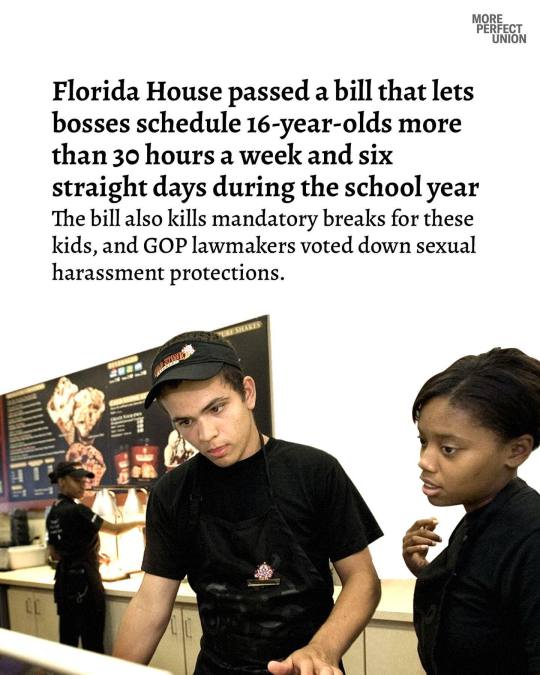


i guess we're starting to see why the gop want to outlaw abortion smfh
#politics#gop#child labor#child labor laws#conservative fuckery#captialism#florida#republicans#smfh#child protections#GOP florida#child rights#child welfare#child labor GOP#child protection rollback#florida politics#child safety#GOP policy#child exploitation#labor regulations#GOP agenda#child welfare rollback#child labor debate#florida legislation#GOP priorities
249 notes
·
View notes
Text
Probably my most unpopular Alfred headcanon is that he didn't participate in the roaring 20's at all because he was busy being a farmer in Oklahoma that decade
#hws america#aph america#Hetalia#it serves narrative purpose in my mind#I headcanon that from about 1835 to 1930 actually wasn't getting paid by the U.S government#and was bouncing from state to state taking human jobs to make ends meet#in the 1910's he was working in the meat packing industry in Chicago#but when he got involved with union organizing for that industry he ended up having to skip town to avoid an FBI raid#flees to Rural Oklahoma and changes his name from Alphonsus Kirkland to Alfred Jones#and this sets him up to be in the middle if the dust bowl in the 30's (a historical period I find much more interesting than the 20's)#the dust bowl causes him to move out to California where he works as a seasonal farm laborer for a while#and then when FDR becomes president putting Alfred back on payroll gets lumped into his social welfare reform#and Alfred finally gets a hand in his own government again#and yeah I know no one else in the fandom agrees with this#but you know#my blorbo and my blog so I'll say what I want
195 notes
·
View notes
Video
Corporate takeover of the US
https://en.wikipedia.org/wiki/Lewis_F._Powell_Jr.
#tiktok#Lewis f powell#powell memo#citizen's united#us supreme court#capitalism is a scam#labor movements#labor movement#advertising#reagan was a terrible president#ronald reagan#reagan#FTC#anti-trust laws#corporate greed#corporate welfare#us political lobbying#us political financing#robert reich#us elections#workers rights#workers vs capital#union workers#price gouging#taxes#history#american history
299 notes
·
View notes
Text
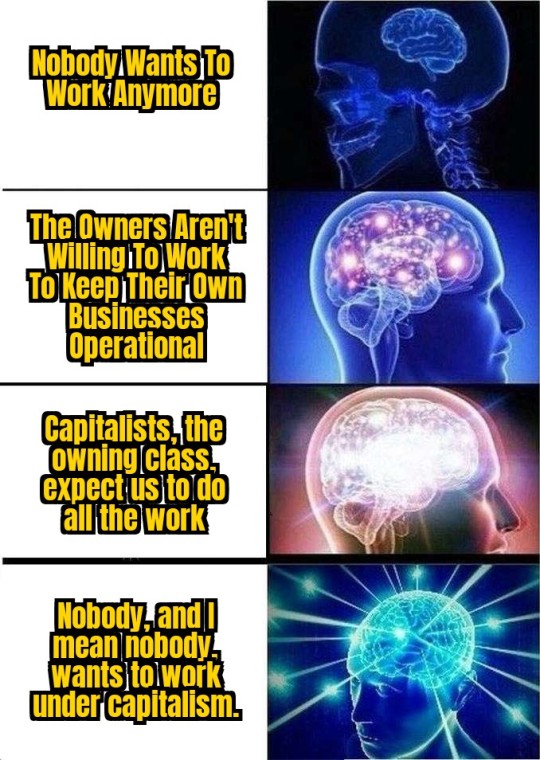
#anti capitalist#capitalism#taking the L#nobody wants to work anymore#fuck the patriarchy#fuck the man#fuck capitalism#labor rights#We Are Literally Financing A Class Of People Who Do Nothing To Better Humanity#The 1% are the real welfare queens#antiwork#punk#leftist#communism#anarchism#anarchy#eat the rich
21 notes
·
View notes
Text
every so often I make the mistake of looking up anything related to single moms online thinking I'll find something written by other children of single moms who love their mothers and am inevitably shocked to see that the hatred of women runs so deep that it's directed to the people who stayed with their families
#bolo speaks#if you say any fuck shit about single moms I will kill you personally#“single moms are poor” well yeah we could talk about the feminization of poverty and how it compounds unpaid domestic labor of parenting#but you don't give a shit about that you just want to blame these women for being on welfare slash#being an inherently emasculating influence on their sons slash breathing air slash existing#“there's no positive male role models” and might I ask WHY those positive male role models are not in the room with us right now?
11 notes
·
View notes
Text

#republicans#rethuglicans#guns#second amendment#gun regulation#child labor#abortion#reproductive rights#child welfare#child marriage#democrats
59 notes
·
View notes
Text
AN OPEN LETTER to THE U.S. CONGRESS
Put the Good Jobs for Good Airports standards in the FAA reauthorization bill!
104 so far! Help us get to 250 signers!
I’m calling on you to stand with working people, passengers and our communities by supporting Good Jobs for Good Airports standards (GJGA) in the FAA reauthorization bill. Airports should and can be strong, vibrant drivers of good jobs in every part of our country. The Good Jobs for Good Airports standards are central to that mission and our nation’s future prosperity. Billions of our public dollars are invested in our nation’s aviation system every year, and we must ensure that our public resources serve the public good. That includes ensuring airports better serve the needs of our families, our passengers, our communities and the airport service workers who make it all possible.
It is evident that our air travel industry is in crisis. From record flight cancellations during summer travel peaks to mountains of lost luggage during the holiday travel season. Airports are critical publicly-funded infrastructure vital to the health of our local communities and global economy, but right now airports aren't working the way they should for travelers or airport service workers — a largely Black, brown, multiracial and immigrant service workforce. These working people, including cleaners, wheelchair agents, baggage handlers, concessionaires and ramp workers, keep airports safe and running smoothly even through a global pandemic, climate disasters and busy travel seasons. Yet many are underpaid and underprotected--even as some major airlines rake in record profit and billions of our tax dollars are invested in our national air travel system.
Domestic passenger numbers increased by 80% between 2020 and 2021, total industry employment fell by nearly 14%, leaving airport service workers to sometimes clean entire airplanes in as little as five minutes as many take on additional responsibilities outside of their typical job duties. Meanwhile, wages have barely budged for airport service workers in 20 years. The Good Jobs for Good Airports standards has the power to transform workers’ lives by ensuring airport service workers have the pay and benefits they need to care for their families.
The Good Jobs for Good Airports standards would help build a stronger, safer, more resilient air travel industry by making airport service jobs good jobs with living wages and benefits like affordable healthcare for all airport workers. Airport service workers at more than 130 covered airports would be supported through established wage and benefit standards, putting money back into hundreds of local economies and helping families thrive. If passed over 73% of wage increases will go to workers making $20 or less, estimates show.
I urge you to include the Good Jobs for Good Airports standards in the FAA reauthorization bill, and help ensure our public money serves the public good.
▶ Created on September 20, 2023 by Jess Craven
📱 Text SIGN PNXUOF to 50409
🤯 Liked it? Text FOLLOW JESSCRAVEN101 to 50409
#JESSCRAVEN101#PNXUOF#resistbot#FAA reauthorization#Good Jobs for Good Airports#airport workers#aviation industry#public infrastructure#labor rights#economic justice#workers' rights#fair wages#benefits#community support#passenger rights#public investment#economic prosperity#airport service workers#living wages#healthcare#job security#labor standards#economic equity#social welfare#income equality#workplace conditions#economic development#local economies#financial stability#worker empowerment
5 notes
·
View notes
Text
Finally some common sense news
TAIPEI (Taiwan News) — Transgender women are not eligible for menstrual leave as they do not have uteruses and do not menstruate, the Ministry of Labor (MOL) said on Thursday (Feb. 10).
CNA reported that after a transgender woman recently applied to take a menstrual day off at her company, the company was unsure of whether she was eligible and asked the local government. The local government passed the question on to the MOL, which consulted the Ministry of Health and Welfare (MOHW).
The MOHW responded to the MOL with an explanation from the Taiwan Association of Obstetrics and Gynecology (TAOG), that transgender women who have received gender reassignment surgery and officially registered their changed sex do not have uteruses and do not menstruate. Since the purpose of the menstrual leave is to provide relief to those who may suffer physical discomfort at work while menstruating, the policy does not apply to transgender women as they do not go through the experience.
According to the Act of Gender Equality in Employment, female employees may legally apply to take one day off for menstrual leave each month if they experience menstruation-related discomfort that prevents them from working. The employees do not need to provide any documentation to apply, and employers may not refuse, issue a penalty, or deem the day off as an absence that affects the employee’s attendance bonus or performance evaluation.
CNA cited the MOL as saying that there is no age limit to employees eligible for the menstrual leave, therefore older women may also take a day off each month as needed. Meanwhile, for women whose uterus or ovary has been removed due to health concerns, as long as the employee still ovulates and experiences discomfort due to hormonal changes, she is eligible for the menstrual leave.
#Taiwan#Menstrual leave#Men don't get periods#Ministry of Labor (MOL)#Ministry of Health and Welfare (MOHW)#Taiwan Association of Obstetrics and Gynecology (TAOG)#Someone needed to hear from a doctor that men don't have uteruses#That should just be common sense#Act of Gender Equality in Employment
9 notes
·
View notes
Text
All right guys, we need to talk. Time for a LONG RANT (TM) about an important topic.
INTRODUCTION
Over the last few years, you may have noticed that Republicans and conservatives have made a lot of noise about protecting children. Some of it came as part of the QAnon conspiracy theory about pedophilia and child sacrifice and some of it came as part of culture war issues like the existence of LGTBQ-etc people.
But one thing that's kind of gone under the radar is all the ways that these same people who claim to be protecting child welfare with every fiber of their being have actually made things far more dangerous for children. Let's run through the list.
INFECTIOUS DISEASES
Honestly, the most important thing that's been done for child welfare in the history of humankind is the massive decrease in child mortality that's been achieved in the past century. Seriously, until the mid 20th century, it was perfectly normal for about half of all children to die before the age of 5. We've come so far on this that now it's a rare tragedy when this occurs.
Part of this mortality was due to malnutrition, we've overcome Malthus (see the Malthusianism Wikipedia article if you're interested), but a huge amount of it is the power of modern medicine to deal with diseases that used to ravage children. Measles, Mumps, Smallpox, Influenza, and a huge amount of other diseases used to sweep through the population regularly either killing children or weakening them for another disease or condition to do the job.
Vaccines have been a huge part of this progress and are a major reason why viral illnesses no longer ravage the population on a regular basis (antibiotics have been similarly effective for bacterial illnesses) and yet there remains a disturbingly large and well-funded movement to advocate against vaccines and particularly childhood vaccinations, largely based on fraudulent claims that have been debunked more than a decade ago.
While it is true that this vaccine skepticism has strains across the ideological spectrum, it is only in the Republican Party where the idea has been given power by elected and appointed officials. No Democratic Surgeon General, for example, has recommended against the (exceedingly safe!) Covid or Measles vaccines, but that's exactly what the Surgeon General of Florida, Joseph Lapado, has done.
This is, of course, far from an isolated incident. A quick search will find dozens, even hundreds, of cases of GOP elected and appointed officials inveighing against vaccines, pushing to remove vaccine requirements, pushing to limit funding to vaccination programs, and generally echoing the most extreme and unproven claims against one of the most powerful public health tools for the protection of children that has ever been developed.
GUN VIOLENCE
Time to talk about guns. For a long time, this was a secondary issue, automobiles were the largest leading cause of death for children pretty much since we dealt with diseases (see the last section). However, over the last several decades, we've worked hard to implement all kinds of safety features that have dramatically brought down the number of children killed in car crashes. Guns, on the other hand…
Well, gun deaths among children have almost doubled in the last decade and, for the first time ever, they are now the leading cause of death for those under the age of 18 (otherwise known as children).
This increase seems to be largely driven by assaults rather than suicides or accidental deaths (though both of those have increased as well). Now, I'm not going to claim that there's a silver bullet for dealing with gun violence, but there are policies that are well supported by research and shown to reduce gun violence. It's also the case that, considered overall, states that lean more toward Democratic policies have significantly lower (and increasingly lower) levels of gun violence than states that lean toward Republican policies.
All the specifics aside, it speaks to priorities. If gun deaths are now the number one killer of children, anyone interested in protecting children would want to do something about that. My accusation of Republican/conservative officials is not that they don't want to implement my preferred policies to address this issue, it's that they consistently refuse to implement any policies that, even theoretically, would be aimed at addressing this issue.
CHILD LABOR
In the early 1900s, child labor was common and widespread, with children often working 12 hour shifts or more with very little in the way of safety and oversight. Over the course of the first four decades of the 20th century, numerous laws were passed to make it illegal to employ children in dangerous jobs or for long hours that would interfere with their education.
Now, despite an uptick in child labor violations and numerous stories of children killed while illegally working dangerous jobs, Republican governors and legislatures in states as disparate as Wisconsin, Iowa, Arkansas, Ohio, and Missouri have been pushing for and passing laws that weaken the protections in place for child workers as young as 14 and sometimes even younger.
RACISM
Racism isn't generally seen as a child issue because it's assumed to affect all ages about equally, but we have to take into account the demographics of this country before assuming that. In fact, children (those under 18) are actually the most racially diverse group in the United States with older groups being much more homogeneously white. In fact, because of this racial difference, racism has a far greater effect on the average child than it does on the average adult.
And, to be clear, there are numerous ways that ongoing racism is actively affecting the health and well-being of children in this country today. Republicans, though, overwhelmingly believe that enough has been done to combat racism and that nothing more should be done to address it.
ACTUAL CHILD ABUSE
Okay, QAnon definitely took this issue and ran off into the woods to do unspeakable things to it, but child abuse is definitely a real issue that impacts children. Unlike the QAnon caricature, though, child abuse tends not to be something carried out by shadowy strangers hidden from public view, but is overwhelmingly (over 90%) committed by someone the child knows personally.
The problem is, by spreading the idea that child abuse is a stranger-danger type of problem, this idea directly impacts efforts to protect children from abuse by draining resources from evidence-based policies and pushing them into nonsense.
Now, you may say "hey, that's QAnon, not Republicans" and, sure, but many elected Republicans are supporters of the QAnon conspiracy (among others) and even those who don't openly profess support are either silent or press for policies based on the conspiratorial worldview. In 2020, 97 open QAnon followers ran in political primaries with 22 Republicans and 2 Independents among them making it to the general election, numerous representatives and party officials have taken part in QAnon organized events, and even Donald Trump, the de facto head of the party and its likely presidential nominee, has repeatedly expressed support for it. It's also notable the only prominent Republicans who have spoken out against QAnon have either been out of office or have quickly either retired or been defeated for re-election.
So, yes, the source of the issue is QAnon, but QAnon is part of the Republican Party now.
LGBTQ-ETC YOUTH
One of the main dangers that Republicans and conservatives like to say they're protecting children from is LGBTQ-ect people, but this also ignores the fact that many children are or will turn out to be LGBTQ-etc themselves. The statistics are pretty clear that suicide rates among this group are twice as high or even higher than the general population but the research is also clear that LGBTQ-etc youth with supportive families and communities have suicide rates that are almost completely back in line with the general public.
There's also no evidence to support the idea that LGBTQ-etc people abuse children at any higher rates than any other group, so targeting them not only fails to deliver any particular gains in child protection, it also alienates LGBTQ-etc youth and drives them to suicide.
POLICIES VS OUTCOMES
So far I've only talked about specific policies, but what do the outcomes look like? There's numerous ways you can measure child well-being, but I figured I'd go with deaths. Specifically, I was able to find good data for both infant mortality and child (1-14) mortality. I then compared this with Ballotpedia's information about party control of state governments over the last 10 years (this link brings you to Colorado, but you can change the state name in the URL to get any state).
Crunch this data and what you find is that Republican control of state government is bad for infant mortality but is REALLY bad for child mortality. There are some outliers, but the pattern is pretty clear that, the longer Republicans had control in a state government and the more control they had, the worse the outcomes are.
Infant mortality is almost 25% higher and the mortality rate of children aged 1-14 is OVER 80% HIGHER in states fully controlled by Republicans than in states fully controlled by Democrats. These patterns also generally hold for the level of partial control as well.
A WORD TO REPUBLICANS/CONSERVATIVES
If you're a registered Republican, if you vote Republican, or if you consider yourself a conservative, you may look at some of this and think "that's not what I believe". And, yes, that's fair, this doesn't perfectly represent the views of every Republican or conservative everywhere.
What it does represent, however, is the view of a large number of people in the party and movement with power. Power that they're using to enact these very policies which, as I think I've shown, endanger children.
You may not identify with these, but your party and movement do.
CONCLUSION
Republicans and conservatives talk a really big game about protecting children but, when you look at what they're actually doing, their policies are one of the biggest threats to children. I don't need a longer conclusion than that.
As usual, if you disagree or have anything to add, please cite your sources appropriately. I think I've done a decent job of that, so I'll just ask that you do the same.
#politics#us politics#republicans#child welfare#child wellness#long rant (tm)#child endangerment#child abuse#lbgtq#racism#qanon#child labor#gun violence#vaccines
4 notes
·
View notes
Text
Is antitrust anti-labor?

If you find the word “antitrust” has a dusty, old-fashioned feel, that’s only to be expected — after all, the word has its origins in the late 19th century, when the first billionaire was created: John D Rockefeller, who formed a “trust” with his oil industry competitors, through which they all agreed to stop competing with one another so they could concentrate on extracting more from their workers and their customers.
If you’d like an essay-formatted version of this post to read or share, here’s a link to it on pluralistic.net, my surveillance-free, ad-free, tracker-free blog:
https://pluralistic.net/2023/04/14/aiming-at-dollars/#not-men
Trusts were an incredibly successful business structure. A bunch of competing companies would be sold to a new holding company (“the trust”), and the owners of those old standalone companies would get stock in this new trust. The trust would operate as a single entity, hiking prices and suppressing wages. If anyone tried fight the trust with a new, independent company, the trust could freeze them out, by selling goods below cost, or by doing exclusive deals with key suppliers and customers, or both. Once a trust sewed up an industry, no one could compete. The trust barons were rulers for life.
The first successful trust was Rockefeller’s Standard Oil, which amassed a 90% share of all US oil. Other “capitalists” got in on the game, forming the Cotton Seed Oil Trust (75% market share), the Sugar Trust (85%). Then came the Whiskey Trust and the Beef Trust. America was becoming a planned economy, run by a handful of unelected “industrialists” with lifetime appointments and the power to choose their successors.
A century after overthrowing the King, America had new kings: “kings over the production, transportation and sale of the necessities of life”. That’s how Senator John Sherman described the situation in 1890, when he was campaigning for the passage of the Sherman Act, the first “anti-trust” act. The Sherman Act wasn’t the first time American lawmakers tried to protect competition, but it was the first law passed after the failure of competition law led to the hijacking of the nation by people Sherman called the “autocrats of trade.”
https://marker.medium.com/we-should-not-endure-a-king-dfef34628153
The Sherman Act — and its successors, like the Clayton Act, are landmark laws in that they explicitly seek to protect workers and customers from corporate power. Antitrust is about making sure that no corporation gets so powerful that it’s too big to fail, nor too big to jail — that a company can’t get so big that it subverts the political process, capturing its own regulators:
https://doctorow.medium.com/small-government-fd5870a9462e
If American workers are derided as “temporarily embarrassed millionaires” who won’t join the fight against the rich because they assume they’ll soon join their ranks, then the American rich are “temporarily embarrassed aristocrats” who would welcome hereditary rule, provided they got to found one of the noble families. The goal of the American elite has always been to create a vast and durable dynasty, wealth so vast and well-insulated that even the most Habsburg-jawed failson can’t piss it away.
The American elite has always hated antitrust. In the 1980s, Ronald Reagan, abetted by Robert Bork and his co-conspirators at the Chicago School of Economics gutted antitrust through something called the “consumer welfare standard,” which ended anti-monopoly enforcement except in instances where price hikes could be directly and unarguably attributed to market power, which is, basically, never.
It’s been 40 years since Reagan took antitrust out behind the Lincoln Monument and shot it in the guts, and America has turned into the kind of aristocratic kleptocracy that Sherman railed against, where “great families” control the nation’s wealth and politics and even its Supreme Court judges:
https://pluralistic.net/2023/04/06/clarence-thomas/#harlan-crow
Anything that can’t go on forever will eventually stop. Monopoly threatens the living standards, health, freedom and prosperity of nearly every person in America. The undeniable enshittification of the country by its guillotine-ready finance ghouls, tech bros and pharma profiteers has led to a resurgence in antitrust, and a complete renewal of the @FTC and @JusticeATR:
https://www.eff.org/deeplinks/2021/08/party-its-1979-og-antitrust-back-baby
Key to the new and vibrant FTC is Commissioner Alvaro Bedoya, who, along with Commissioner Rebecca SlaughterFTC and Chairwoman Lina Khan, is part of the Democratic majority on the Commission. Bedoya has a background in tech and privacy and civil rights, and is a longtime advocate against predatory finance. He’s also a law professor and a sprightly scholarly writer.
Earlier this week, Bedoya gave a prepared speech for the Utah Project on Antitrust and Consumer Protection conference, entitled “Aiming at Dollars, Not Men.” It’s a banger:
https://www.ftc.gov/system/files/ftc_gov/pdf/bedoya-aiming-dollars-not-men.pdf
Criticisms of the new antitrust don’t just come from America’s oligarchs — the labor movement is skeptical of antitrust as well, and with good cause. Antitrust law prohibits collusion among businesses to raise prices, and at many junctures since the passage of the Sherman Act, judges have willfully perverted antitrust to punish labor organizers, treating workers demanding better working conditions as if they were Rockefeller and his cronies conspiring to raise prices.
This is the subject of Bedoya’s speech, whose transcript is painstakingly footnoted, and whose text makes it crystal clear that this is not what antitrust is for, and we should not tolerate its perversion in service to crushing worker power. The title comes from a 1914 remark by Democratic Congressman Thomas Konop, who said, of antitrust: “We are aiming at the gigantic trusts and combinations of capital and not at
associations of men for the betterment of their condition. We are aiming at the dollars and not at men.”
Konop was arguing for the passage of the Clayton Act, a successor to the Sherman Act, which was passed in part because judges refused to enforce the Sherman Act according to its plain language and its legislative intent, and kept using it against workers. In 1892, two years after the Sherman Act’s passage, it was used to crush the New Orleans General Strike, an interracial uprising against labor exploitation from longshoremen to printers to carpenters to hearse drivers.
Bosses went to a federal judge asking for an injunction against the strike. Though the judge admitted that the Sherman Act was designed to fight “the evils of massed capital,” he still issued the injunction.
The Sherman Act was used to clobber the Pullman Porters union, which organized Black workers who served on the Pullman cars on America’s railroads. The workers struck in 1894, after a 25% wage-cut, and they complained that they could no longer afford to eat and feed their families, so George Pullman fired them all. The workers struck, led by Eugene Debs. Pullman argued that the strike violated the Sherman Act. The Supreme Court voted 9:0 for Pullman, ordered the strike called off, and put Debs in prison.
In 1902, mercury-sickened hatters in Danbury, CT demanded better working conditions — after just a few years on the job, hatters would be disabled for life with mercury poisoning, with such bad tremors they couldn’t even feed themselves. 250 hatters at the DE Loewe company tried to unionize. Loewe sued them under the Sherman Act, and went to the Supreme Court, who awarded Loewe $6.8m in today’s money, which allowed Loewe to seize his former workers’ homes.
This is what sent Congress back to the drawing board to pass the Clayton Act. Though the Sherman Act was clear that it was about trustbusting, the courts kept interpreting it as a charter for union-busting. The Clayton Act explicitly permits workers to form unions, call for boycotts, and to organize sympathy strikes.
They made all this abundantly clear: writing in language so plain that judges had to understand the legislative intent. And yet…judges still managed to misread the Clayton Act, using it to block 2,100 strikes in the 1920s. It appears that passing the Clayton Act did not save a single strike that would have been killed by the bad (and bad faith) Sherman Act precedents that led to the Clayton Act in the first place.
The extent to which greedy bosses used the Clayton Act to attack their workers is genuinely ghastly. Bedoya describes one coal strike, against the Red Jacket Coal Company of Mingo, WV. The mine’s profits had grown by 600%, but workers’ wages weren’t keeping up with inflation. The miners sought a raise of $0.10 on the $0.66 they got paid for ever carload of coal they mined. The company didn’t even pay the workers with real money — just “company scrip”: coupons that could only be spent at the company store. Red Jacket gave its workers a $0.09/car raise — and raised prices at the company store by $0.25/item.
The workers struck, Red Jacket sued. The Fourth Circuit refused to apply the Clayton Act, following a precedent from a case called Duplex Printing that held that the Clayton Act only applied to people who stood “in the proximate relation of employer and employee.”
Congress was pissed. They passed the Norris-LaGuardia Act of 1932, with LaGuardia spitting about judges who “willfully disobeyed the law…emasculating it, taking out the meaning intended by Congress, making the law absolutely destructive of Congress’s intent.” Norris-LaGuardia creates an antitrust exemption for labor that applies “regardless of whether the disputants stand in the proximate relation of employer and employee.” So, basically: “CONGRESS TO JUDGES, GET BENT.”
And yet, judges still found ways to use antitrust as a cudgel to beat up workers. In Columbia River Packers, the court held that fishermen weren’t protected by the exemption for workers, because they were selling “commodities” (e.g. fish) not their labor. Presumably, the fish just leapt into the boats without anyone doing any work.
The willingness of enforcers to misread antitrust continued down through the ages. In 1999, the FTC destroyed the hopes of the some of the country’s most abused workers: “independent” port truckers, who worked 80 hours/week and still couldn’t pay the bills. Truckers were only paid to move trailers around the ports, but they were required to do hours and hours of unpaid work — loading containers, hauling equipment for repair, all for free. The truckers tried to organize a union — and the FTC subpoenaed the organizers for an investigation of price-fixing.
But the problem wasn’t with the laws. It was with judges who set precedents that — as LaGuardia said, “willfully disobeyed the law…emasculating it, taking out the meaning intended by Congress, making the law absolutely destructive of Congress’s intent.”
Congress passed laws to strengthen workers and judges — temporarily embarrassed aristocrats — simply acted as if the law was intended to smash workers. But by 2016, judges had it figured out. That’s when jockeys at the Camarero racetrack in Canóvana, Puerto Rico went on strike, demanding pay parity with their mainland peers — Puerto Rican jockeys got $20 to risk their lives riding, a fifth of what riders on the mainland received.
Predictably, the horse owners and racetrack sued. The jockeys lost in the lower court, and the court ordered the jockeys to pay the owners and the track a million dollars. They even sued the jockeys’ spouses, so that they could go after their paychecks to get that million bucks.
The case went to the First Circuit appeals court and Judge Sandra Lynch said: you know what, it doesn’t matter if the jockeys are employers or contractors. It doesn’t matter if they sell a commodity or their labor. The jockeys have the right to strike, period. That’s what the Clayton Act says. She overturned the lower court and threw out the fines.
As Bedoya says, antitrust is “law written to rein in the oil trust, the sugar trust, the beef trust…the gigantic trusts and combinations of capital…dollars and not at men.” Congress made that plain, “not once, not twice, but three times, each time in a louder and clearer
voice.”
Bedoya, part of the FTC’s Democratic majority, finishes: “Congress has made it clear that worker organizing and collective bargaining are not violations of the antitrust laws. When I vote, when I consider investigations and policy matters, that history will guide me.”

There's only three days left in the Kickstarter campaign for the audiobook of my next novel, a post-cyberpunk anti-finance finance thriller about Silicon Valley scams called Red Team Blues. Amazon's Audible refuses to carry my audiobooks because they're DRM free, but crowdfunding makes them possible.
#pluralistic#jockeys#antitrust#labor#history#judicial overreach#Alvaro Bedoya#consumer welfare standard#trustbusting#sherman act#new orleans general strike of 1892#pullman union#pullman porters#eugene debs#mad hatters#danbury hatters#clayton act#red jacket coal company#Fiorello LaGuardia#Norris-LaGuardia Act#duplex printing#Columbia River Packers#puerto rico#Camarero racetrack
219 notes
·
View notes
Text
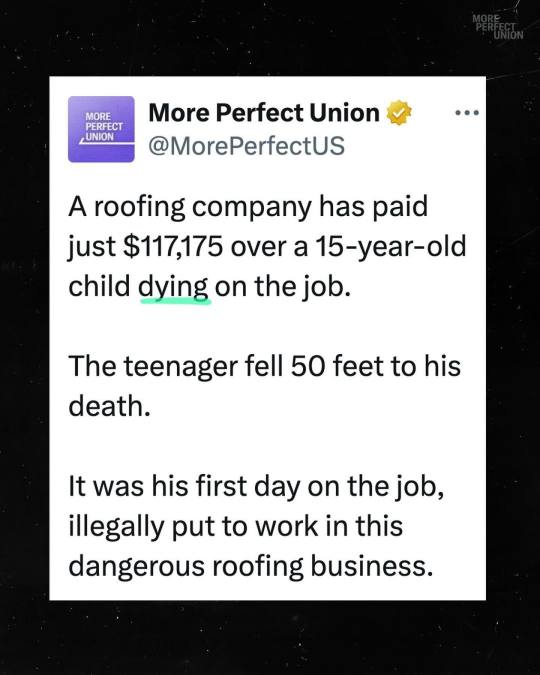
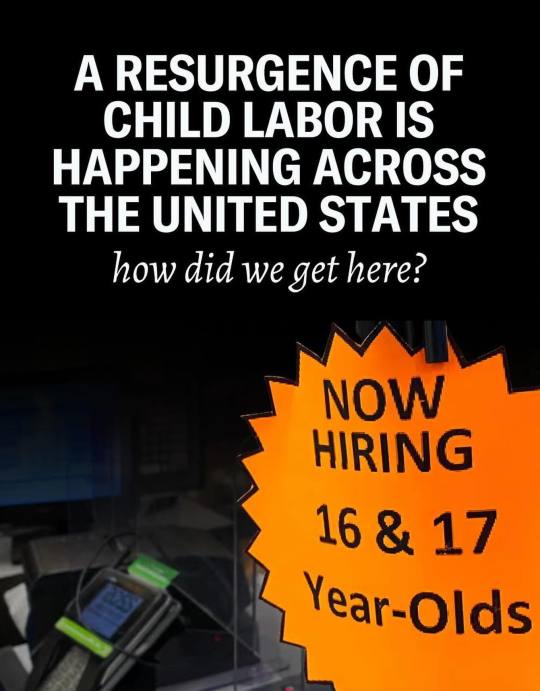
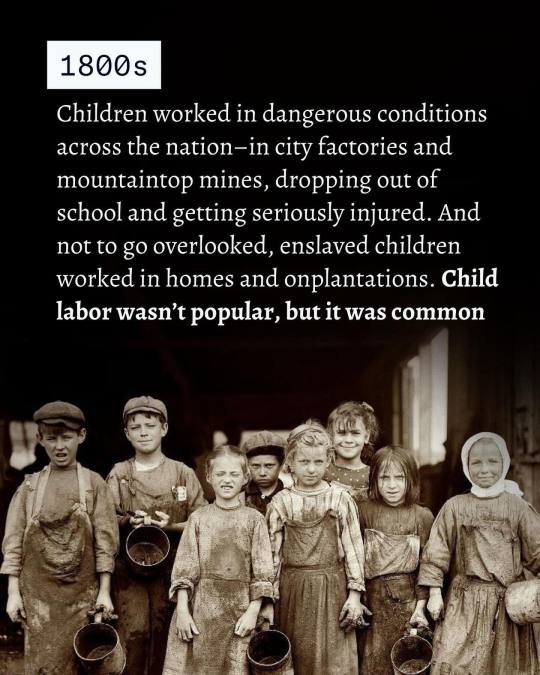




youtube

when you combine this with the efforts to extend retirement age to 70 and over, it's very clear that our politicians, but specifically gop conservatives, are hell-bent on sacrificing the population at the altar of capitalism. they want us to start working earlier and to work longer into our lives, all while not paying a living wage and raising the price of just about everything. it is the continuing evil of capitalism run amok.
#Youtube#child labor#labor protections#gop red states#child rights#child welfare#child labor laws#child protection rollback#child exploitation#child labor reform#gop laws#child advocacy#labor standards#gop agendas#child welfare rollback#child labor debate#workplace standards#child protection#child well-being#gop control#child labor policy
60 notes
·
View notes
Text
chris minns calling victoria a ‘welfare state’ is so embarrassing, come on man. this gst thing is so stupid
#i have actual thoughts but i’m not bothered explaining#wanting it to be based on population is understandable but not realistic#esp for wa. the biggest state (by far) is gonna need more for infrastructure#and a labor mp calling somewhere a ‘welfare state’ is just. mate. wtf are you doing#personal#auspol
4 notes
·
View notes
Note
humans can only clothe themselves with animal organs! dogs are only socially fulfilled by humans! im very smart!
You don't appear to be, but I guess everyone's entitled to their (idiot) opinions...
Anyway, this gives me a good excuse to summarise why I have a problem with animal rights movements, namely the fact that they have absolutely no respect for humans.
You clowns feel like it's morally correct to troll people on the internet because we disagree with you (you obviously know it's not, otherwise why hide your username?) You think bullying, marginalising, and threatening violence against people is okay if it means you prove your point, even in the face of mountains of evidence that demonstrates how wrong you are.
The people who advocate for an end to all forms of animal 'exploitation', by and large, aren't people who interact with animals on a daily basis. They're not people who are directly involved in the care of farm animals, the protection of wildlife, or the training and breeding of pets. They're not people who have ever hunted grouse, butchered a pig, or tanned a moose hide. That level of removal from interspecies relationships leads to a lot of unrealistic and absolutely false beliefs about animals and how we engage with them.
Take the people who claim you grind up bees to get honey, or who believe shearing a sheep and skinning a sheep are the same thing (with wasn't a fringe idea, that was put forward by PETA). It's easy to prove these extreme examples false, but lots of people still believe them. How many other things do you not understand about animals because you've never been close enough to them to learn? How many more lies is your cause selling you to gain support, that you don't know better than to believe?
And what's the best way to drum up unquestioning support from people who don't know better? You make them angry.
That unjustified rage, fuelled by pictures of cute baby animals and graphic gore, is usually directed at people who are already marginalised.
I've heard animal rights extremists suggest that independent farmers (my family included) should be sentenced to life in prison for owning and managing livestock.
I've read articles flippantly suggesting that Inuit communities above the arctic circle, living below the poverty line, should be forced to ship vegetables thousands of kilometers (using fossil fuels) at great expense, because their health and ability to afford basic necessities is less important than the lives of a few sustainably hunted seals.
I've watched protesters screaming slurs hold signs that called for Indigenous people to be hunted for sport over a legal, humanely undertaken, and culturally vital whale hunt. That hunt was postponed several times, because extremists (who claimed they were there to preserve life) tried to capsize sea canoes full of people.
It takes almost nothing to push the animal rights movement to violent racism, class warfare, and abuses of human rights. Where does that hatred come from? How can you care about any kind of life when you meet the concerns of human beings who tell you you're hurting them with dehumanising mental gymnastics and vicious attacks?
So why should I indulge this bullshit? Why would I trust the opinions of people who who have no experience with animals over my own lived experience? Why would I care what your lot think, when you'd happily let people I care about die to uphold your faulty belief that humans are somehow better than nature and can opt out of our relationships with other species on a whim?
If anyone wants sources they can ask for them off anon. Otherwise google it like a big kid. It takes literally 30 seconds to verify that animal rights extremists do more harm (to people and animals) than good.
#animal rights#or you know an excuse to treat humans you dont like as trash#because they both shake out to the same thing#if animals could talk theyd also tell you peta is bullshit#racism#violence#indigenous peoples#indigenous rights#any indigenous group working on conservation projects is probably doing more for animal welfare#than all the vegans yelling about how honey exploits the labor of bees#any group youre targetting with this shit has a system figured out to take care of the species they utilise#the vegans are at it again#gimme a soapbox motherfucker ive always got a speech prepared#ask#anons who think theyre making a point
75 notes
·
View notes
Text
"Robinson
Let’s think about alternatives. If you’re having coffee with someone who’s new to anti-capitalism, and you’re blowing their mind — you’re calling into question various assumptions that they’ve held all their lives and suggesting that things they’ve taken for granted or taken as fixed features of the social world can be changed — where do you start in order to guide our alternative vision? What kind of economy do we need to make in order to have justice?
Wetzel
Well, I appeal to two principles that I call principles of natural justice. That’s because I think they’re rooted in human nature. One is the principle that people should have control over the decisions that affect them. This implies that workers should be able to cooperatively, collectively self-manage the labor process, their own work, and the workplace. Self-management is a general principle for the reconstruction of social institutions. People can make their own decisions and cooperate with others; it’s a human ability. And the other principle is what I call equal access to resources for developing your potential, developing your skills, and maintaining your abilities. That implies free healthcare and education and so forth. Those will be the foundational principles. And then it leads us to our vision of a socialist economy.
Robinson
These two principles are very, very useful. We can think about society and institutions as they exist now and imagine the changes we would need to make to make those principles a reality."
- Tom Wetzel being interviewed by Nathan J. Robinson, from "How Do We Overcome Capitalism?" Current Affairs, 6 October 2022.
#tom wetzel#nathan j. robinson#quote#quotations#democratic socialism#labor#labor organizing#self management#public good#human nature#social welfare#political activism#social justice#anti capitalism#capitalism
26 notes
·
View notes